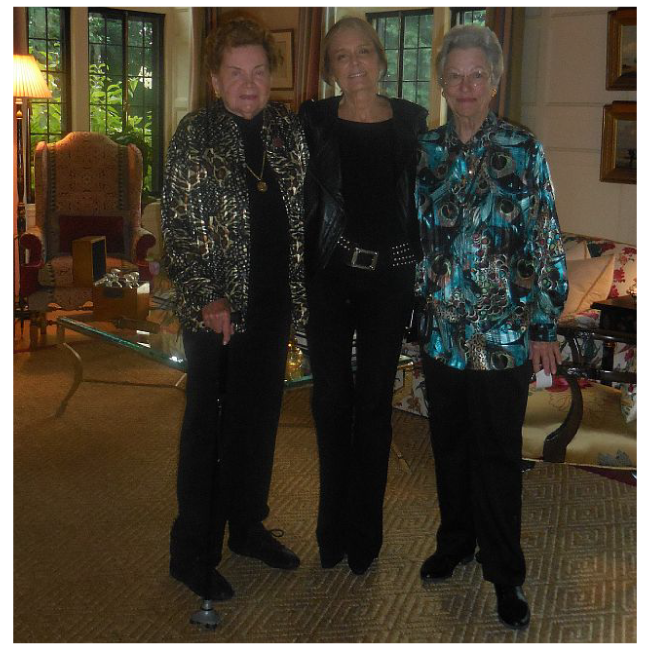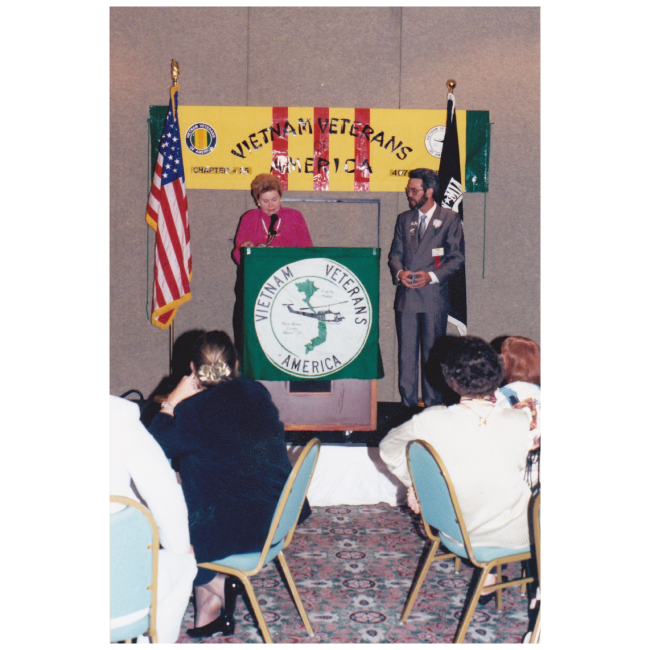Youth and College
Shortly after Barbara Dusty Roads was born in 1928 in Cleveland, Ohio, Charles Lindbergh landed his airplane in her parent’s backyard. The event would shape the family’s lifelong passion for aviation. Dusty and her brother were Cleveland Air Races fans and both grew up wanting to fly. Dusty wanted to become a WASP (Women Airforce Service Pilots) but they disbanded before the end of WWII. After the war, women were not allowed to become commercial pilots. Instead, Dusty went to college and earned a B.A. in English Literature from the Flora Stone Mather College for Women (now Case Western Reserve University). She still wanted to fly, though, so after she graduated in 1950, she got a job as a Stewardess for American Airlines. She had no idea that decision would eventually lead her to make history.
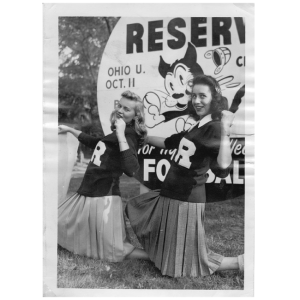
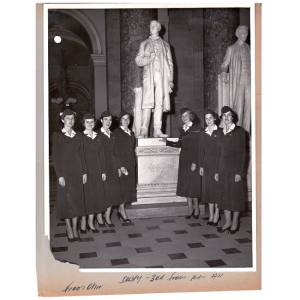
Discriminatory Work Policies
In 1953, American Airlines implemented a policy restricting the age of stewardesses’ continuing employment. At age thirty-two, stewardesses hired after 1953 faced mandatory retirement. This was in addition to already existing rules requiring termination if they married. Male executives in the airline industry just assumed that stewardesses would end up meeting a man on board, marrying him, and leaving their jobs by age thirty-two anyway. If they didn’t, the airlines thought there was something wrong with them. But many stewardesses loved their job and wanted to make it a career.
Trailblazer Against Discrimination
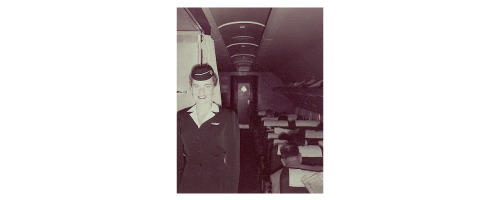
The unfair and sexist policy outraged Dusty. Since she was hired in 1950, she was retroactively exempt from the new rule. So, she realized she had nothing to lose by fighting it. Her Midwestern sense of fair play propelled her into action on behalf of her colleagues. She began working with union leaders to protest the rule and quickly became a union negotiator, grievance representative, and vice-chair of the Los Angeles base.
In 1958, the national union, ALSSA (Airline Stewards and Stewardesses Association), appointed Dusty their congressional representative to Washington, D.C. She got no extra pay for this additional job and had no choice but to perform her lobbying duties during her regular Los Angeles to Washington D.C. flight layovers. This was a time when there was a scarcity of female representatives and senators in Congress. But there were Congressmen eager to meet with a stewardess and listen to Dusty’s story about the age regulation in their offices or over lunch. “I was the cheapest lobbyist in the world,” Dusty says. “Congressmen took me out to lunch.” She befriended and was supported by Rep. Martha W. Griffiths (D-MI) and Evy Dubrow, a lobbyist for the International Ladies’ Garment Workers Union (ILGWU). When a bill to repeal the age rule was introduced by a Congressman, it was dubbed “The Old Broads Bill” by others and failed by ridicule. That was when Dusty realized they weren’t just fighting airline industry management but national gender discrimination against women.
An Old Bag at Thirty-two?
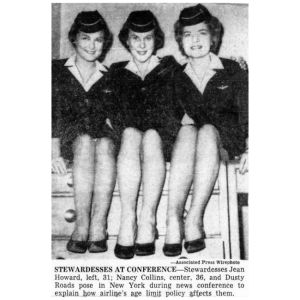
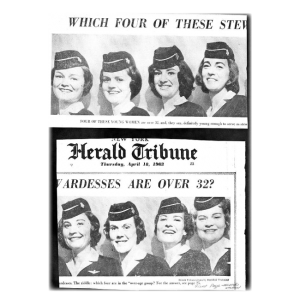
After ten years of FAA testimonies, lobbying, and negotiating without any compromise by the airlines, Dusty knew she had to do something dramatic to bring national attention to the plight of the stewardesses. In April 1963, she and Nancy Collins organized a press conference at the Commodore Hotel in New York City where she challenged the gentlemen of the press to guess which of the eight stewardesses there were under thirty-two and which were over thirty-two. It wasn’t easy. She said, “A Lolita, I’m not. But do I look like an old bag?” The other seven stewardesses asked, “What’s wrong with us at age thirty-two?” Every major newspaper in the country printed their story, and Dusty became an overnight sensation. But negotiations continued to stall.
An Uphill Battle for Civil Rights
In 1964, President Johnson signed the Civil Rights Act into law. Title VII of that Act prohibits workplace discrimination on the basis of race and color, national origin, sex, and religion.
In 1965, Dusty and American Airlines stewardess Jean Montague, who was about to be fired at age thirty-two, were ready to take their fight to the Equal Employment Opportunity Commission. The EEOC was the government’s administrative agency responsible for enforcing the new federal employment discrimination laws. The morning the EEOC opened its doors for men and women to file complaints, the two stewardesses walked in and became the first in the country to file a discrimination complaint based on the Civil Rights Act. It would be the first time the staff at the EEOC recognized that discrimination came in the form of gender bias as well as racial discrimination. However, it would take three more years and the threat of an American Airlines stewardess strike before the EEOC issued an official decision eliminating the airline industry termination policy and the ban on marriage in 1968. Dusty and other stewardesses who filed complaints are known to have been at the forefront of protecting employment and equal rights protection against discriminatory actions in their profession under Title VII. Later, Dusty was the driving force at American Airlines, instigating their union to split from the Transport Workers Union to become an independent union, the APFA (Association of Professional Flight Attendants). Today, Dusty is remembered by many in the airline industry as the prime mover and inspiration whose actions put women in the cockpit and men back in the cabin.
A Long-Term Professional Career
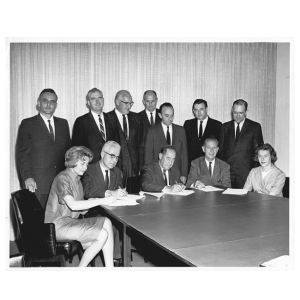
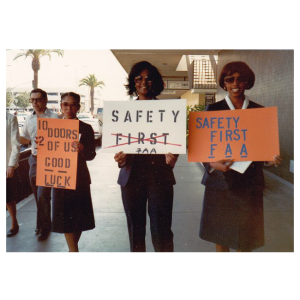
Dusty continued her career in flight, including flying commercially contracted Military Air Command flights transporting troops to and from the Vietnam War and, after that, other commercial overseas routes, until she retired at the age of sixty-six.
Protection Against Repeating History
Dusty’s story is a poignant reminder of the cultural and social history of the 1950s that led to the women’s rights movement and demonstrates how women with persistence and resolve to fight for fairness can win. Years later, in a conversation with Gloria Steinem at a fundraiser for the Women’s Center at Case Western University, she thanked Dusty and reminded her that her early work was the spark that ignited the Women’s Liberation Movement.
Dusty continues to promote the need for ongoing vigilance and safeguarding workplace protections. She sets an example for women, young and older, on the values of organized labor unions, personal economic independence, networking, and speaking up for their rights. She has enjoyed many radio and TV appearances and was featured in a segment of the 2013 Makers: 100 Women Who Made America documentary. In 2014, Dusty, Jean, and author Elaine Rock attended and spoke at Dusty’s Alma Mater, Case Western Reserve University’s 10th Anniversary of the Women’s Center celebration. During a local fundraiser, Dusty thanked Gloria Steinem for all she did for women, but Gloria reminded her that she “was the one who started it all.” Later, Dusty was chosen as one of the 2017 National Women’s History Month honorees for “Trailblazing Women in Labor and Business.” in 2019, Dusty was invited to be a keynote speaker at the Makers Conference. Unfortunately, she became ill and was unable to attend, but Gloria Steinem gave a poignant summary of Dusty’s importance to the women’s movement and why the stewardesses were at the forefront of fighting for their equal rights against the airline industry’s discriminatory labor policies. On Feb. 20, 2024, PBS aired an American Experience documentary, “Fly With Me.” featuring, among others who fought the airlines’ discriminatory practices, Dusty, Jean, and Elaine Rock, the author of the forthcoming book “Dusty Roads: How the Women’s Movement Took Flight.” Dusty passed away on November 21, 2023.
